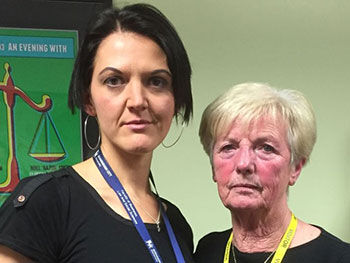Expert comment Last updated 04 March 2019

Birmingham City University criminologists Professor Elizabeth Yardley and Lucas Danos show their support for the 'Helen's Law' campaign launched by Marie McCourt, whose daughter was killed in 1988.
We recently had the privilege of meeting Marie McCourt, the mother of Helen McCourt. Helen was just 22 years old in February 1988 when she disappeared on her way home from work. In 1989, pub landlord Ian Simms was convicted of her murder and sentenced to serve a minimum of 16 years in prison.
Simms’ conviction was something of a landmark. It was only the third case since the Second World War where an offender had been convicted of murder without a body and the first case of its kind to use DNA evidence. Helen’s blood was found in the private quarters of his pub. One of her earrings was discovered in the boot of his car. Carpet fibres from the pub were found on Helen’s clothes, which were dumped on a riverbank. Electrical flex found with the clothes was traced back to the pub and is believed to have been used to kill Helen. Simms gave a false alibi covering the hours after she went missing and had scratch marks on his face and neck when questioned by police.
Simms’ minimum tariff has long since ended. He has remained in prison but the question of parole has been regularly coming onto the table for several years now. He is now in an open prison – the final phase in a lifers’ journey in which they prepare for their eventual release.
However, Simms has never disclosed the location of Helen’s body.
Helen’s case is not unusual. Many other families have seen their loved ones’ killers convicted without a body. For example Winnie Johnson, the mother of 12-year-old Keith Bennett, sadly died without knowing where his killers disposed of his body. The killer of five-year-old April Jones has never revealed the whereabouts of her body. The family and friends of Keith, April and many others like them are left not only with the unimaginable grief that follows the murder of a loved one, but with the ambiguity and sense of limbo associated with not knowing where their body is.
We have worked with many individuals convicted of homicide offences and in doing so, we’ve developed insights into what true reform really means. People can change. Even those convicted of the most heinous crimes have the capacity for reform. Offenders who have caused unimaginable harm have gone on to make a positive contribution to society, however small. We should give everyone this opportunity.
However, with rights come responsibilities.
Before any killer can change, they need to accept that they are accountable for their crime and take steps to address the underlying traits and behaviours that led to the decision to take someone else’s life. Murder is a choice. Murderers do not kill because they have ‘snapped’ or ‘lost control’. More often than not, murder is an attempt to regain control. Deprived of their liberty, knowledge of where their victims’ bodies are is one of the few things killers in ‘no body’ murder cases are still able to control.
Murderers decide to kill their victims. They can decide to disclose the location of their remains too. These are individuals with choices. They can choose to continue to cause harm or they can choose to minimise this harm.
We should never grant parole to convicted killers who continue to harm others and wield power over them. The need to exert control in such a malicious way is not indicative of positive change. It’s a worrying continuity which suggests that someone is far from a reformed character.
We are supporting the campaign for Helen’s Law, which calls for the following:
- The denial of parole for convicted murderers for as long as they refuse to disclose the whereabouts of their victim’s remains.
- Passing a whole life tariff (automatically denying parole or release) until the offender discloses the location (and enables the recovery) of their victim’s remains.
- Automatically applying the rarely-used common law offences in trials of murder without a body:
o Preventing the burial of a corpse and conspiracy to prevent the burial of a corpse;
o Disposing of a corpse;
o Obstructing a Coroner.
Helen’s Law isn’t an extreme reaction of the ‘lock them up and throw away the key’ variety. It’s a law that enables hope and facilitates moving forwards, both for offenders and for victim’s families. Murder casts a long shadow. Actions cannot be undone. Victims cannot be brought back to life. But making parole conditional on revealing the whereabouts of remains is a crucial step on the journey to change and reform. Letting go of the ownership, possession and control that many murderers feel over their victims is an important part of the process of change. This isn’t just about ticking a box, saying what a parole board want to hear or delivering a well-crafted performance. This law is about real transformation, humanity and humility.
Helen McCourt’s family deserve the opportunity to give her a funeral and final resting place. A final resting place of their choosing, not Simms’.
You can support the campaign for Helen’s Law by signing the petition. Find out more about Helen’s case in the first episode of When Missing Turns to Murder, which will be screened on the Crime + Investigation channel at 9pm on Monday 4 March.
Image copyright: Helen's Law Campaign.